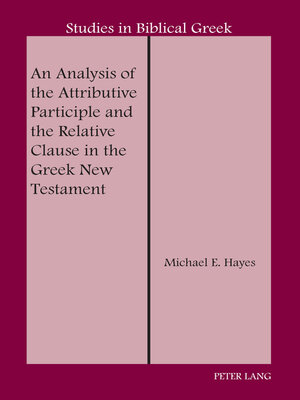An Analysis of the Attributive Participle and the Relative Clause in the Greek New Testament
ebook ∣ Studies In Biblical Greek
By D.A. Carson

Sign up to save your library
With an OverDrive account, you can save your favorite libraries for at-a-glance information about availability. Find out more about OverDrive accounts.
Find this title in Libby, the library reading app by OverDrive.



Search for a digital library with this title
Title found at these libraries:
| Library Name | Distance |
|---|---|
| Loading... |
Many New Testament Greek grammarians assert that the Greek attributive participle and the Greek relative clause are "equivalent." Michael E. Hayes disproves those assertions in An Analysis of the Attributive Participle and the Relative Clause in the Greek New Testament, thoroughly presenting the linguistic categories of restrictivity and nonrestrictivity and analyzing the restrictive/nonrestrictive nature of every attributive participle and relative clause. By employing the Accessibility Hierarchy, he focuses the central and critical analysis to the subject relative clause and the attributive participle. His analysis leads to the conclusion that with respect to the restrictive/nonrestrictive distinction these two constructions could in no way be described as "equivalent." The attributive participle is primarily utilized to restrict its antecedent except under certain prescribed circumstances, and when both constructions are grammatically and stylistically feasible, the relative clause is predominantly utilized to relate nonrestrictively to its antecedent. As a result, Hayes issues a call to clarity and correction for grammarians, exegetes, modern editors, and translators of the Greek New Testament.







